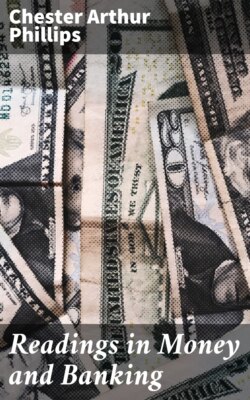Читать книгу Readings in Money and Banking - Chester Arthur Phillips - Страница 87
На сайте Литреса книга снята с продажи.
BANKING OPERATIONS AND ACCOUNTS
ОглавлениеTable of Contents
[31]The intermediate employed in actual transactions is, in increasing degree, that form of currency called credit, the lowest order of currency, rather than money itself. Checks and drafts make up a progressively larger share of the circulating medium. The net deposit credits in the national banks in the United States—to say nothing of the other banks—are double the volume of the actual money in the country. And a large share of this actual money is really employed as reserves to support the credit circulation. More than 90 per cent. of the larger sorts of transactions are mediated through the use of deposit credit, and probably more than one-half of the remaining transactions are similarly effected. Thus the study of banking is essential to any understanding of monetary problems. …
[32]For a bank, as well as for any other considerable establishment, it is requisite that a capital should be provided at the outset. There can be no constant proportion between the amount of this capital and the extent of the business which may be built up by its means. We can only say that, other things being equal, the larger the business that can be carried on with safety with a given capital, the larger will be the field from which profits can be earned, and the higher the proportion which the profits will bear to the original investment; but the point at which the extension of the business passes the line of safety, must be determined by the circumstances of the particular bank, by the kind of business carried on by those dealing with it, and by the condition of the community in which it is established. The attempt has sometimes been made to limit by law for incorporated banks the proportion of transactions for a given amount of capital, but no such provision has any foundation except a conjectured average, too rough to be of service in any individual case. In this respect, as in so many others, the judgment of the persons most interested, acting under the law of self-preservation, is far more trustworthy than any legislative decision.
The capital thus to be provided at the outset is, of course, in the case of a private bank, the contribution of the partners, as in any other undertaking. In the case of an incorporated bank the capital is divided by law into equal shares or units of fixed amount; as e.g., under the law of the United States, a capital of $100,000 is divided into 1,000 shares of $100 each; and these shares are contributed by the individual shareholders, in such proportion as they please. The law may as a matter of public policy limit the proportion of capital stock to be owned by any one individual or firm, and it may also limit the liability of shareholders for debts due by the bank, in case of its failure; but in general, in the absence of special provisions to the contrary, the powers, rights, and liabilities of every shareholder are now usually determined by the number of shares of the stock contributed or owned by him. In the election of directors and of other officers for the immediate management of the business, every share entitles its owner to cast one vote; the dividend of profit is divided in the ratio of shares owned, and contributions to meet losses, if required by law, are called for in the same ratio.
The capital subscribed by the intending shareholders must necessarily be paid in in money or in the legal tender of the country. It is not necessary that the whole should be paid in at the outset, but the payment of the whole usually precedes the full establishment of the business; and, in the case of incorporated banks, the law often requires that some definite proportion, as e.g., one-half, shall be paid in before the opening of business, in order to insure good faith and a solid basis for the business undertaken.
If, now, we undertake to represent by a brief statement of account the condition of a bank having a capital of $100,000 paid in, in specie, on the morning when it opens its doors for business, we shall have the following:
